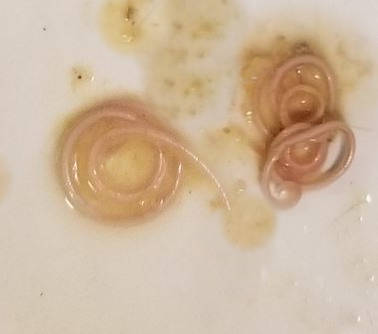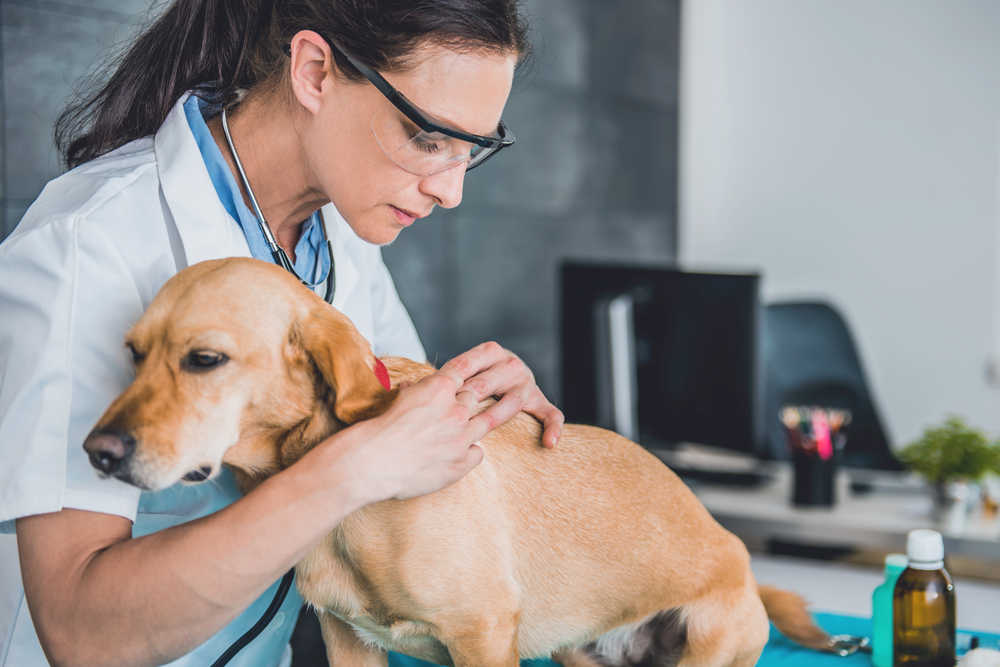
As a veterinarian working in a clinic for dogs and cats, I see pets infested with worms on most days. While I encounter dogs with worms so often, it is actually very rare for me to see a dog vomiting worms. This happens when they have a very heavy worm burden. When they do vomit worms, it will usually be roundworms, which are long and thick like spaghetti. In this article, I will explain what it means when your dog vomits worms, and most importantly what you can do to help.
Key highlights from Dr. Simon:
– Dogs vomiting worms usually have a heavy worm burden & need veterinary help.
– Dewormers containing Fenbendazole can be effective.
– Consider giving your dog a bland diet and probiotics.
– Consult your vet immediately to identify any underlying health issues such as gut obstruction, anemia, or malnutrition. Proper treatment is crucial.
– Your dog may need multiple rounds of treatment and repeat fecal tests to ensure the worms are gone
Overview of worms-infested vomit in dogs: what it looks like
Below is a picture of roundworms that have been vomited out of the dog’s stomach (You can click here to view more pictures of worms in dog’s vomit). This dog will have had worms for some time and will likely be quite unwell. We would expect other signs such as a pot belly and diarrhea.

This picture on aPaws.org shows tapeworm in vomit. We would not commonly see a dog vomiting tapeworm, but it is technically possible (More often, we would see segments of the tapeworm stuck to the fur around the dog’s anus).
What to do when your dog vomits worms [immediate at-home care]
If you find worms in your dog’s vomit, do not despair, this should be an ‘easy fix’ with the help of your veterinarian:
1. Consider using a broad acting dewormer, such as one containing Fenbendazole.
All cats and dogs in the household will need to be treated. See this example product on Amazon:

Panacur is given as a one off dose in an adult dog, or over the course of 3 days in a puppy. Always check with your vet and follow the guidelines written on the label. The amount needed will depend on your pet’s age.
How often we then give the wormer is, again, dependent on the pet’s age. For young puppies we generally dose them every 2 weeks until 12 weeks old, then monthly until 6 months old and then every 3 months for life.
Even though a dog vomiting worms means their worm burden is heavy, we do not need to give any additional worming treatment or to prolong the course.
2. Clean up any stool that is in the home or garden.
Cleaning up dog stools in the garden is essential when dogs have worms because untreated stool can contain worm eggs or larvae, potentially contaminating the environment and increasing the risk of reinfection for the dog and transmission to other pets or humans.
3. Consider giving your dog a bland diet and probiotics.
It is also wise to start your pet on a bland diet and some probiotics, to treat any diarrhea they are experiencing. To prevent dehydration, we can offer a rehydration solution. Learn more about proven bland diets for dogs.
One nice example of a bland diet is boiled white chicken and white rice. This should contain no seasoning or oils and we feed it little and often e.g. 3-4 small meals a day.
Probiotics are good bacteria and examples include Enterococcus and Lactobacillus. Within the probiotic paste, there may also be anti-diarrhoea ingredients such as Kaolin an pectin, to help bind the stool. We usually give a 3-5 day course, though we sometimes advise ongoing probiotics, especially for those with underlying gastrointestinal disorders.
4. Always consult with your vet as soon as possible.
Your dog should be brought to the local vet clinic, so the vet can check them over and determine which parasites they have and if there are any other underlying issues (such as a gut obstruction, anemia or malnutrition).
If you see tapeworms, be aware that these can be transmitted by fleas, so do check to see if your pet may have a flea infestation too.
Can I use over-the-counter deworming medications?
Yes, many OTC de-wormers are actually very effective. A wide range of wormers can be bought from places like pet shops and Amazon. and work well. However, not all OTC products are worth buying. Some are ineffective and many will only treat one or two types of worms. Contact your vet to ask which wormer they would recommend for your pooch.
Treatment options and likely costs
Treatment costs for intestinal parasites are typically inexpensive, with the medicine costing between $15 and $50. Remember that your dog may need multiple rounds of treatment and repeat fecal tests to ensure the worms and their eggs are gone.

Dogs vomiting worms should be checked by a veterinarian
While we can easily treat worm infestations from home, if your dog is at the point that they are vomiting worms, it is best the vet checks them over. Such a heavy burden of worms can lead to anemia, dehydration and gut blockages. So, having a vet check your pet over, is definitely the right move.
The critical role played by your veterinarian
The primary treatment for intestinal parasites is a deworming product. These can be pills, liquids, or injectables. Your veterinarian can confirm diagnosis and determine the right medication to help your dog: the specific medication will depend on the type of parasite your dog has – not every dewormer covers every kind of worm. For example, praziquantel treats tapeworms, but it will not get rid of roundworms.

Dewormers may not cure your dog of the worms with one treatment. Some medications kill adult worms but not any larval or immature stages. Because of intestinal parasites’ unique life cycles, you may need to repeat treatments every 3-4 weeks.
Your veterinarian will also be able to run the right tests to confirm that the worms are gone.
Risks associated with untreated worm infestations
Not treating worms is not the way to go. Chronic worm burdens leads to a dog that has an unkempt coat, poor muscle condition, lethargy, anemia, weight loss and chronic diarrhea. A very heavy worm burden can even lead to a gut obstruction, gut perforation, sepsis and death. Not only will your dog suffer – the people in your home are at risk of an infestation too.
It is generally puppies who are worst affected, particularly if the breeder has never de-wormed them or their mother and I then see them at eight weeks of age for their first vaccine.
Symptoms of worms-infested vomit in dogs
- Vomiting. As mentioned, vomiting is a rare sign of worms in dogs. While it can happen, I see it infrequently. In the last year working in a veterinary practice, I can only think of 2 or 3 cases, and these have all been puppies. Veterinarians who work in shelters and rescues may well deal with dogs vomiting worms more often.
- Diarrhea. One of the most common signs of internal worms, we will usually see is diarrhea. Dogs may pass sloppy or watery poo and this can happen frequently. The stool may contain fresh red blood and/or mucus.
- Weight loss. As the worms cause diarrhea and they consume the nutrients in the food, it is no surprise that they also lead to weight loss. Despite a bloated belly (due to gas build up), we may see the dog is becoming boney.
- Lethargy. As worms use up nutrients and energy, taking them from the dog, the dog can become less energetic. This is especially seen in cases of hookworm, as the worms consume blood, leading to anemia and fatigue.
- Increased appetite. As the worms are consuming the food within the gut, dogs need to eat more to try and meet their calorie needs. So, owners may notice they are ravenous and scavenging for food wherever they go.
How did my dog get worms? Most likely causes for worms in dogs
1. Transmitted from mom
The mother dog can infect her pups with roundworms while they are still in the uterus as well as when nursing them. This is why it is advised that a pregnant bitch is wormed regularly and that pups are given a de-wormer every two weeks from two weeks of age.
Breeders should be following a strict worming protocol, while those buying the pup should always ask which wormers have been used and when.

2. Ingested from places like soil and puddles
Parasites are all around us, though the small eggs and larvae are not visible to the naked eye. As animals poop outside, when another dog comes along, they may get infected when they eat small particles of infested poop. While we cannot stop our dogs from exploring the world around them, we can keep them up to date with a regular de-wormer. If they are sniffing near another dog’s stool be sure to call them away.

3. Raw meat feeding
One of the reasons many professionals advise against raw feeding is because of the increased risk of parasites. Cooking meats like pork and beef thoroughly is an important way of preventing tapeworm spread.

4. Fleas
Fleas transmit tapeworm so once we see fleas on our pet, we should be asking ourselves if they’re up to date with their wormer. The dog can ingest the worm eggs when they eat the flea as they are grooming themselves. Fleas are more common in dogs who share their homes with cats, but can occur in any dog. Most vets advise routine de-fleaing.

Would a vet be able to help over a video call?
Certainly, a video call or online consult could be a good idea here. If you have seen worms in the vomit, you can show the vet a picture or video clip so they can determine which type of worms are present.
The vet will ask about any other symptoms your dog is displaying and will discuss the best treatment option based on their age, size and the suspected parasites involved. While the vet cannot analyse the dog’s stool or check them in person, they can still provide useful advice Re next steps.
Frequently Asked Questions
How often should I deworm my dog?
The answer depends on your dog’s lifestyle and where in the world they are. As a very rough guideline, we de-worm pups every 2 weeks until 12 weeks old, then monthly until 6 months old, then every 3 to 6 months for life.
Can my dog’s diet affect the risk of worm infestations?
Yes. Those fed raw meat that has not been frozen or processed are at highest risk. Similarly, dogs who hunt and eat vermin are more likely to get worms.
How long does it take for deworming medication to work?
De-wormers work rapidly, within a matter of hours.
Disclaimer: This website's content is not a substitute for veterinary care. Always consult with your veterinarian for healthcare decisions. Read More.


Be the first to comment